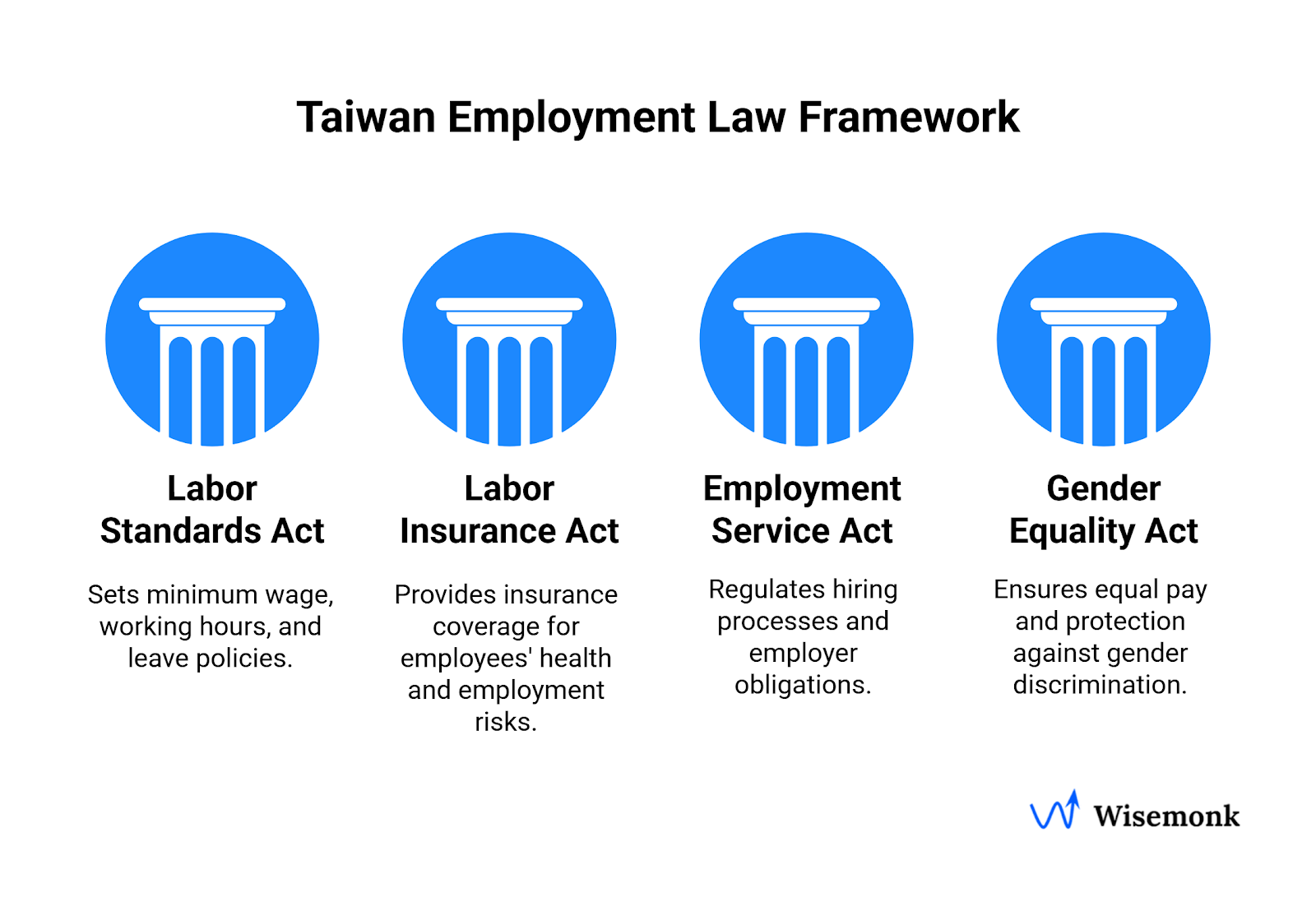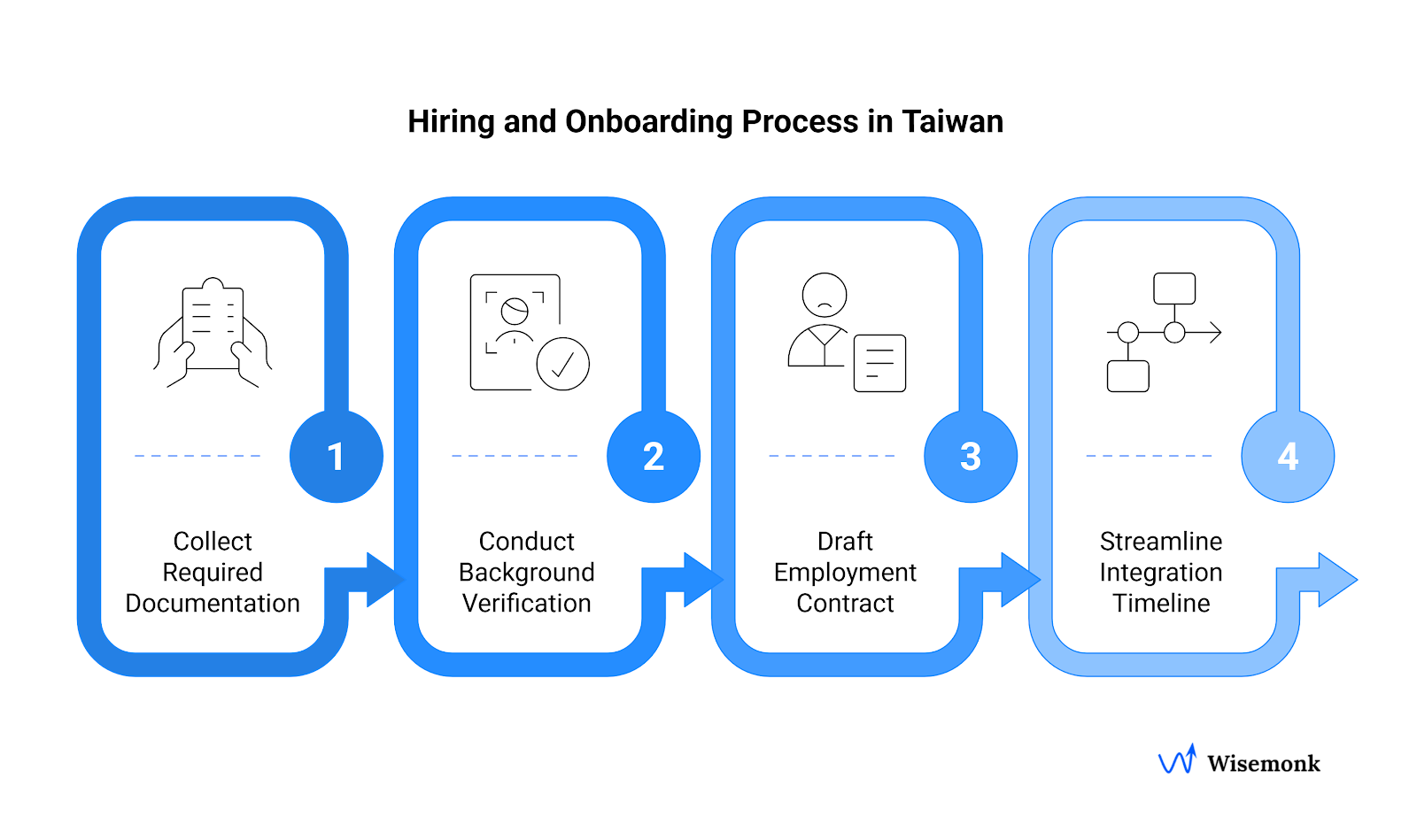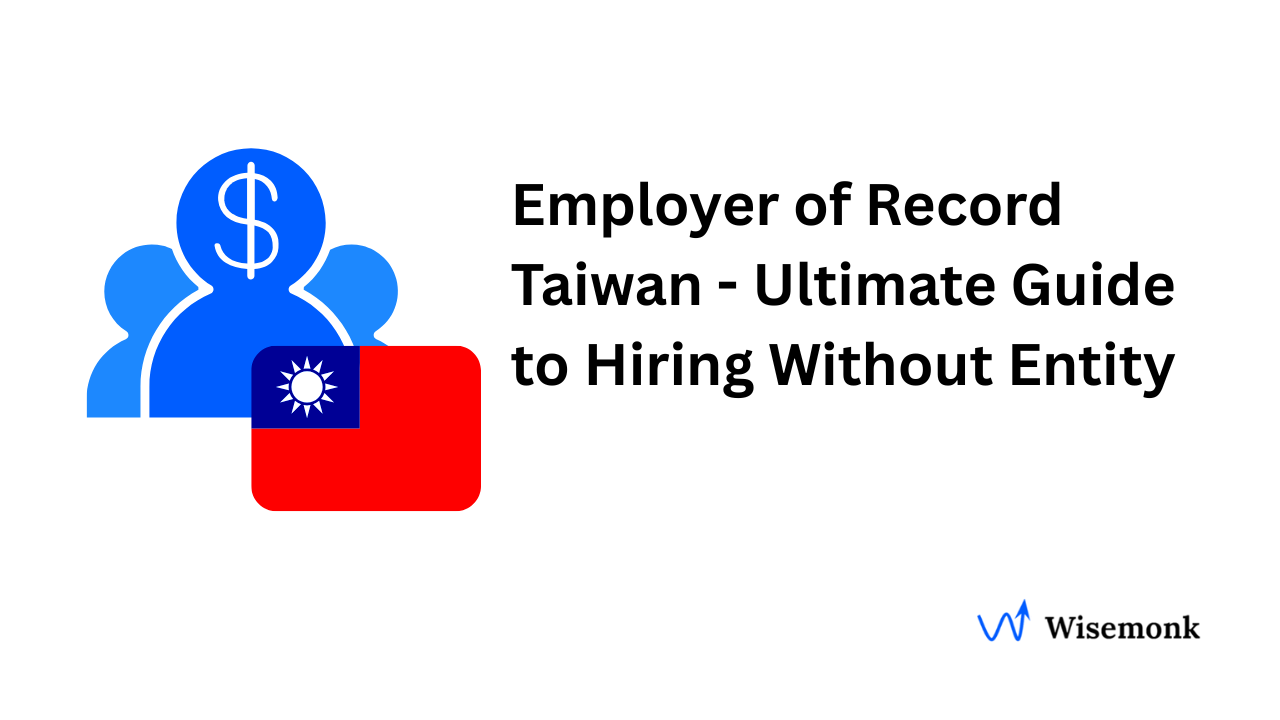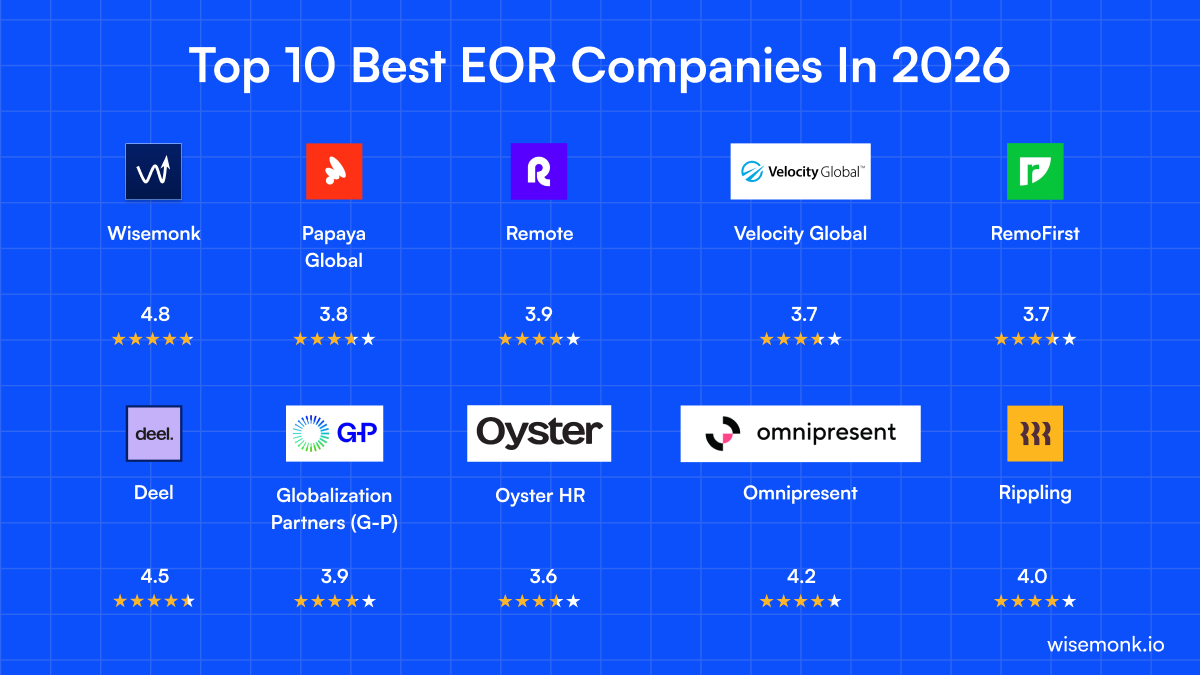Curious how to effortlessly hire employees in Taiwan? Taiwan’s booming economy and skilled workforce make it a top destination for global companies, but navigating local labor laws, labor insurance, and statutory benefits can quickly get overwhelming. In our experience working with international employers, relying on an Employer of Record EOR in Taiwan lets you hire employees, meet employment regulations, and manage payroll, without creating a local entity or worrying about compliance. This way, you focus on growth while your business stays secure and fully compliant in Taiwan’s dynamic market.
Let’s dive deep into everything you need to know about employer of record services in Taiwan and how they simplify your global hiring journey.
What is the Taiwanese Employment Law Framework?[toc=Employment Law Framework]
Understanding the legal landscape is essential before employing workers in Taiwan. Taiwanese labor laws are comprehensive and protect both local employees and foreign workers, so let’s look at the core regulations that shape employment contracts and business practices here.

Taiwan’s Key Employment Laws:
- Labor Standards Act
Sets the rules for minimum wage, working hours, annual leave, overtime, notice period, and severance pay. These standards ensure each employment agreement meets national requirements. - Labor Insurance Act
Covers ordinary risk insurance, employment insurance, and health insurance for eligible employees. This law governs statutory benefits, employee contributions, and employer responsibilities regarding labor insurance. - Employment Service Act
Regulates the hiring process for both local and foreign companies. It outlines procedures for hiring foreign workers and lays out employer obligations for legal compliance, including work permit requirements and probationary period limitations. - Gender Equality in Employment Act
Addresses anti-discrimination policies related to gender, maternity leave, and supports workplace equality. This act mandates equal pay and protection for pregnant employees.
Adhering to these local laws and updating company policies as regulations evolve is crucial for international companies seeking to hire employees and maintain legal compliance in Taiwan’s dynamic market.
Employers must stay current as employment regulations update regularly, especially to efficiently handle benefits administration, employee entitlements, and proactively minimize legal risks.
What are the Key Benefits of Taiwan EOR?[toc=Key Benefits of EOR]
Now that we know the legal basics, let’s see why an EOR is a game-changer in Taiwan. Choosing an employer of record Taiwan offers a host of advantages for foreign companies looking to hire employees quickly and compliantly. Here’s why so many international companies make this move:
- Speedy Market Entry: Skip the paperwork of forming a local entity and onboard talent right away.
- Total Legal Compliance: Stay on top of evolving Taiwanese labor laws and benefits, EOR services handle it all.
- Access to the Best Talent: Tap into Taiwan’s skilled international workforce without local hiring headaches.
- Platform for Regional Growth: Easily expand across Asia while keeping business practices and payroll services consistent.
Based on our experience as a leading EOR service provider, these benefits let you focus on scaling your business while your EOR partner takes care of the rest.
How Does Payroll and Tax Work in Taiwan?[toc=Payroll & Tax Compliance]
Setting up payroll and tax in Taiwan can seem complex, but with the right partner, it’s straightforward. Here’s what you need to know to keep your business compliant:
- Taiwan’s Tax System
- Employers are required to withhold payroll taxes from employee salaries.
- Employees must pay income tax, which is calculated on a progressive scale ranging from 5% to 40%.
- It is mandatory to file annual tax returns, and employees must receive monthly pay slips detailing their earnings and deductions.
- Labor Insurance Contributions
- Both employers and employees are obligated to contribute to labor insurance, which provides ordinary risk insurance and employment insurance coverage.
- The rates for labor insurance contributions are determined by the Labor Insurance Act and may change periodically to reflect regulatory updates.
- National Health Insurance
- Every employee, including foreign workers, is entitled to national health insurance, with contribution costs shared between the employer and the employee.
- The legal employer, often your employer of record in Taiwan, will handle registration for health insurance and ensure timely payments.
- Monthly and Annual Filings
- Employers must submit monthly filings for payroll, social security, and labor insurance to comply with local regulations.
- All annual bonuses and records of unused annual leave must be accurately reported for regulatory and tax purposes.
Letting a Taiwan employer of record manage payroll services helps you avoid compliance pitfalls, ensuring every detail is properly handled according to local labor laws and employment regulations.
What Employee Benefits and Entitlements Should Employers Provide in Taiwan?[toc=Employee Benefits]
Every Taiwan employer must offer certain benefits, and understanding them is key to both compliance and happy teams. Here’s a quick snapshot of what’s standard in a Taiwanese employment contract:
- Annual Leave Entitlement: Employees earn paid annual leave based on service length, following national holidays and local regulations.
- Special Leave Provisions: Unused annual leave can sometimes be carried over or compensated, and there are rights to unpaid sick leave and paid leave for specific situations like the Dragon Boat Festival or Mid-Autumn Festival.
- Overtime Regulations: Overtime rules are set under the Labor Standards Act, with clear rates and limits to protect workers' time.
- Severance Pay Requirements: Severance pay must meet standards outlined in the Labor Standards Act and Labor Pension Act, calculated by service years and salary.
Handling statutory benefits properly ensures smooth business operations and helps attract and retain Taiwan employees, whether local employees or foreign workers.
How Does the Hiring and Onboarding Process Work in Taiwan?[toc=Hiring & Onboarding Process]
Now that we’ve covered employee benefits, let’s explore how employers in Taiwan navigate the hiring process smoothly while staying compliant with local labor laws.

Here’s what you need to know:
- Required Documentation: Employers must collect valid identification, work permits (for foreign workers), and signed employment agreements that reflect local employment regulations and the Labor Standards Act.
- Background Verification: Conducting background and reference checks is common to verify qualifications, ensuring a good fit for both local employees and foreign workers.
- Employment Contract: Contracts must clearly state terms of employment, including probationary period, working hours, salary, benefits, and notice period to meet Taiwan employment laws.
- Integration Timeline: With an employer of record in Taiwan, this process is streamlined, typically completing onboarding within weeks, helping you hire employees quickly without setting up a local entity.
Based on our experience managing international workforce expansion, a clear, compliant hiring process protects your business and sets your Taiwan team up for success.
How to Manage the Taiwanese Workforce Effectively?[toc=Workforce Management]
Now that we’ve covered the hiring process, let’s explore how to best manage your team in Taiwan, keeping things productive and culturally aligned.
- Understanding Taiwanese Work Culture: Taiwanese workplaces value a clear respect for hierarchy, where managers act as supportive guides, and teamwork is key; employees prioritize the group’s success over individual wins. A strong work ethic is also central, with dedication, long hours, and visible commitment being the norm, reflecting a culture that encourages everyone to stay fully engaged and present.
- Communication Styles: Taiwanese communication is usually subtle and indirect, aiming to keep harmony and avoid direct criticism so no one loses "face." It relies a lot on reading between the lines and non-verbal cues, with a strong emphasis on using polite, respectful language, especially when speaking to superiors or elders.
- Performance Management: In Taiwan, employee performance is often measured through clear KPIs that focus on tangible results. Feedback tends to be given privately and tactfully to avoid embarrassment, fostering a respectful work environment. Continuous professional growth is encouraged, with many opportunities for training and skill development, especially in industries that prioritize upgrading employee capabilities.
Managing Taiwanese employees successfully means blending respect for cultural nuances with clear communication and consistent support. This understanding helps foster a motivated, loyal, and high-performing workforce.
What Should Employers Know About Labor Insurance and Benefits in Taiwan?[toc=Labor Insurance & Benefits]
Employers must provide mandatory benefits covering labor insurance, national health insurance, and pension contributions. Here are the essentials:
- Labor Insurance: Mandatory for almost all employees. Covers injury, illness, disability, maternity, retirement, and death. Both employer and employee share premiums, with the employer paying a larger portion. For current rates and details, refer to the Bureau of Labor Insurance.
- Employment Insurance: Part of the labor insurance system, offering support for unemployment, vocational training, and living allowances. Both parties contribute. Details are in the Employment Insurance Act.
- National Health Insurance (NHI): All employees, including foreign workers, must be enrolled. Employers register and share premium costs with employees; NHI ensures comprehensive health coverage. More info is from the National Health Insurance Administration.
- Pension Contributions: Employers must contribute at least 6% of monthly wages to each employee’s individual pension account under the Labor Pension Act.
Meeting these requirements isn’t just about legal compliance; it ensures a secure, attractive work environment for both local and foreign employees.
What Are the Termination Procedures Employers Must Follow in Taiwan?[toc=Termination Procedures]
Now that we’ve covered labor insurance and benefits, let’s discuss how termination works under Taiwanese labor laws to help employers manage risks and follow proper protocols.
- Dismissal Categories and Procedures: Termination can be due to just cause, ordinary reasons, or mutual agreement. Employers must have documented reasons and follow prescribed steps depending on the category.
- Severance Pay Calculations: Severance pay depends on the employee’s length of service and monthly wage, calculated according to the Labor Standards Act and the Labor Pension Act. Accurate computation is essential to avoid disputes.
- Notice Requirements: Employers typically must provide advance notice or pay in lieu, usually at least 10 to 30 days, depending on the employment contract or statutory minimums.
- Legal Risk Mitigation: Proper documentation, respecting notice periods, and understanding labor union roles can reduce the risks of wrongful termination claims under Taiwanese labor laws.
Carefully managing the termination process preserves your company’s reputation while ensuring compliance with Taiwan’s employment regulations.
What Should You Know About Cost Analysis and Financial Planning for Employer of Record in Taiwan?[toc=Cost Analysis & Financial Planning]
If you’re planning to hire in Taiwan through an employer of record (EOR), here are the essentials for quick, smart budgeting:
EOR Service Pricing
- Flat Fees: Most EORs charge a flat monthly fee per employee. Some use a 10–15% fee based on gross salary, covering payroll and statutory benefits.
- Setup Fees: Many charge a one-time setup or onboarding fee between $500 and $2,000; always review what's included.
Insurance and Tax Implications
- Labor Insurance: Both employer and employee contribute to a legally mandated fund covering workplace injuries, illness, and maternity. The employer usually pays a higher portion (about 7.35% for labor insurance in 2025). More: Bureau of Labor Insurance.
- Health Insurance: All employees (locals and foreigners) must be registered in the National Health Insurance with shared premiums. The employer manages enrollment and deductions.
- Pension Contributions: Employers contribute at least 6% of monthly wages to each employee’s pension account, as required by the Labor Pension Act.
- Income Tax: Employers withhold progressive income tax from salaries (5% to 40%) and file annually.
Benefits Budgeting
- Must Budget: Labor insurance, health insurance, pension, annual paid leave, and often a 13th-month salary. These statutory benefits are required by law.
- Extra Perks: Many companies offer supplemental insurance or flexible leave to attract talent. EOR providers keep your benefits in line with changing labor regulations.
ROI Calculations
- EORs save you the cost and hassle of forming a local entity, great for new market entry or small teams.
- Payroll, compliance, and benefits costs scale alongside your team.
- Admin burden and legal risk remain minimal since EORs handle all filings and updates with local authorities.
For detailed employer obligations and calculations, always check current rules at the Bureau of Labor Insurance, the National Health Insurance Administration, and the Labor Pension Act.
What Common Challenges Will You Face and How Can You Solve Them?[toc=Challenges]
Expanding to Taiwan is exciting, but there are a few hurdles to be aware of. Here’s how employers tackle them:
- Language Barriers: Mandarin is the business language. Many use bilingual EOR partners to bridge gaps.
- Cultural Integration: Embrace local customs, team-oriented work, and indirect communication for smooth collaboration.
- Regulatory Compliance: Labor laws change, EORs keep you compliant and up-to-date.
- Scaling Your Team: EOR services offer easy headcount changes without the hassle of new paperwork.
Based on our experience, addressing these challenges early makes hiring and scaling in Taiwan a lot smoother for international companies.
Key Takeaways[toc=Key Takeaways]
Expanding to Taiwan offers great opportunities thanks to its dynamic economy and skilled workforce. Partnering with an employer of record in Taiwan lets you bypass complex local labor laws, onboarding hurdles, and payroll challenges, making market entry faster and fully compliant.
In our experience as a leading EOR service provider, using an EOR provides a reliable platform for scaling your team while managing legal risks and employee benefits effectively. It’s a smart choice for foreign companies aiming to establish a presence without the burden of setting up a local entity.
Next steps? Get clear on Taiwan’s employment regulations, choose the right EOR partner with local knowledge, and focus on growing your business confidently in this vibrant market.
Ready to expand your global workforce quickly and compliantly? Partner with Wisemonk’s Employer of Record services to effortlessly manage hiring, payroll, and compliance, so you can focus on growing your business with confidence.
Frequently asked questions
What are the work permit requirements for Taiwan?
Foreign workers need a valid work permit before starting employment, which the employer or EOR typically helps secure by submitting required documents to the Ministry of Labor.
How does the labor insurance system work?
Both employers and employees contribute to labor insurance that covers injury, sickness, maternity, and retirement; premiums and details are managed under the Bureau of Labor Insurance.
What are the severance pay requirements?
Severance pay is calculated based on an employee’s years of service and salary, as outlined in the Labor Standards Act and Labor Pension Act, ensuring fair compensation.
How long does it take to hire through EOR in Taiwan?
Hiring via an employer of record usually takes a few days to a couple of weeks, significantly faster than setting up a local entity.
What are the cultural considerations for managing Taiwanese employees?
Respect hierarchy, use polite indirect communication to maintain harmony, and emphasize teamwork and continuous development for effective management.
What is the role of an EOR?
An Employer of Record (EOR) manages payroll, benefits, HR, and compliance on behalf of a company, helping reduce administrative burdens and legal risks.
What is the purpose of an EOR?
The purpose of an EOR is to act as the legal employer in another country, handling all compliance and legal obligations while your company manages day-to-day work with the employee.

.png)
%20(1).webp)
